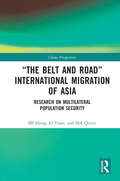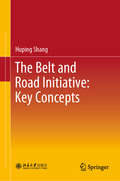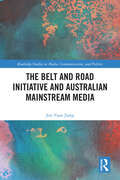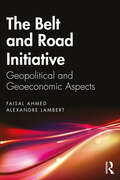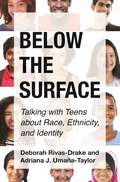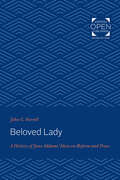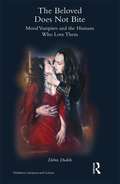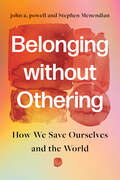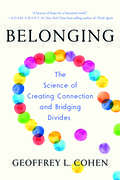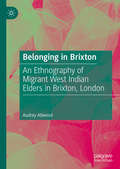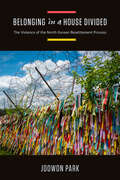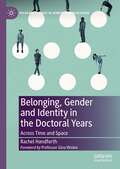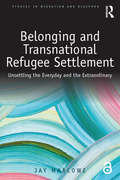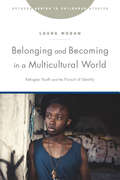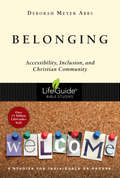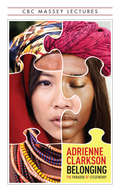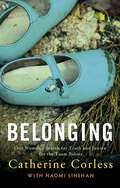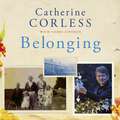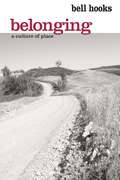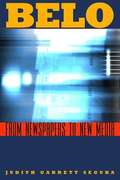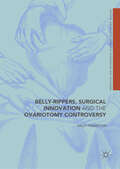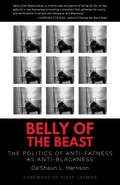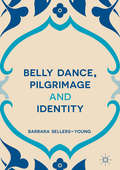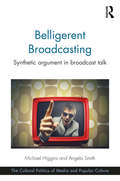- Table View
- List View
“The Belt and Road” International Migration of Asia: Research on Multilateral Population Security (China Perspectives)
by MI Hong LI Yuan MA QiyiniThe book studies multilateral population security issues and relevant governance strategies caused by international migration in the countries impacted by China’s Belt and Road initiative and their border areas.Buttressed by solid data mining and policy analysis, the title looks into the demographic trends of international migration in China and some Asian Belt and Road countries and stresses the urgency for more effective governance practices. Seeking to address the population security crisis triggered by the Initiative, the authors propose the idea of “multilateral population security governance”, grounded in the real-world challenges facing Belt and Road countries while also drawing on experiences of migration governance in western countries. As a new governance model, it calls for cross-border joint action and takes into consideration pertinent factors including economy, politics, culture, religion and commerce. Several case studies and comparative studies are offered in the chapters to illuminate the significance and effect of this cooperative mechanism.The book will be of interest to researchers and government officials interested in non-traditional security, international migration and formal demography as well as topics on population, resources and environment.
The Belt and Road Initiative: Key Concepts
by Huping ShangThis book introduces the “Belt and Road” in its entirety, including what it is, what it aims to do, what it can do and how. This book can serve as a helpful resource for the general public, it can improve their understanding about the “Belt and Road” and its relative economics, policy, culture and so on. Also, this book is good reading for academics, as well as students of public management, politics, finance and economics. The “Belt and Road” advances a whole complementary set of new ideas on international cooperation. Conforming to the principles of peace and cooperation, openness and inclusiveness, mutual learning and mutual benefit, it stipulates policy coordination, facilitates connectivity, unimpeded trade, financial integration and people-to-people bonds as the five major contents, and promotes practical cooperation in all fields. It also works to build an open and win-win regional community featuring mutual political trust, economic integration and cultural inclusiveness.
The Belt and Road Initiative and Australian Mainstream Media (Routledge Studies in Media, Communication, and Politics)
by Jon Yuan JiangThis book focuses on Australian mainstream media narratives about the Belt and Road Initiative (BRI) from 2013 to 2020. Set against the background of Sino-Australian relations and taking into account the different media systems of China and Australia, this book also critically investigates the Chinese public diplomacy narratives of the BRI. Drawing on my analysis and semi-structured interviews with prominent experts in this area, the book addresses an important but under-explored question: how have Australian mainstream media narratives portrayed the BRI of the Chinese Government from 2013 to 2020?This book fills a gap regarding the portrayal of the BRI in Australian mainstream media and provides new insights into the reasons for narrative shifts in the coverage of the BRI. More concretely, the book finds that the public diplomacy narratives of the BRI were not explained well by Chinese officials, thus allowing Australian journalists and commentators to project their own negative, fearful narratives of China onto the BRI project, particularly from 2017 onwards. More importantly, this book argues that the Australian Federal Government’s policy towards China had a significant impact on the Australian media’s coverage of the BRI; that the media clearly followed the Australian Federal Government’s lead, and not vice versa. Thus, in many ways, Australian mainstream media narratives of the BRI have had a similar outcome as China’s ostensibly much more restrictive and propagandistic state-dominated media system.Noticeably, this book not only has academic significance in the international research community but also holds practical importance in the real world, benefiting Australian business leaders, media professionals, think tank specialists, and policymakers.
The Belt and Road Initiative: Geopolitical and Geoeconomic Aspects
by Faisal Ahmed Alexandre LambertThis book studies the geopolitical and geoeconomic aspects of China’s Belt and Road Initiative (BRI). It argues that the BRI has the potential to redesign the spatial and territorial dimensions of governance and effectively counterbalance the hitherto predominant hegemonies of the Anglo-American sea power. The volume: Highlights the main geopolitical patterns, including geographical, economic, financial, technological, and strategic factors guiding the BRI on a global scale Presents a historical account of the development of the Silk Road and underlines its contemporary relevance Traces China’s growing inf luence from Eurasia to America Discusses how the Initiative is likely to transform international relations by the middle of the 21st century. A comprehensive guide to China’s rise as the new centre of gravity in global geopolitics, the book will be indispensable for students of political studies, geopolitics, international relations, and foreign policy. It will also be useful for policymakers, strategic investors, think tanks, and government officials.
Below the Surface: Talking with Teens about Race, Ethnicity, and Identity
by Deborah Rivas-Drake Adriana Umaña-TaylorA guide to the latest research on how young people can develop positive ethnic-racial identities and strong interracial relationsToday’s young people are growing up in an increasingly ethnically and racially diverse society. How do we help them navigate this world productively, given some of the seemingly intractable conflicts we constantly hear about? In Below the Surface, Deborah Rivas-Drake and Adriana Umaña-Taylor explore the latest research in ethnic and racial identity and interracial relations among diverse youth in the United States. Drawing from multiple disciplines, including developmental psychology, social psychology, education, and sociology, the authors demonstrate that young people can have a strong ethnic-racial identity and still view other groups positively, and that in fact, possessing a solid ethnic-racial identity makes it possible to have a more genuine understanding of other groups.During adolescence, teens reexamine, redefine, and consolidate their ethnic-racial identities in the context of family, schools, peers, communities, and the media. The authors explore each of these areas and the ways that ideas of ethnicity and race are implicitly and explicitly taught. They provide convincing evidence that all young people—ethnic majority and minority alike—benefit from engaging in meaningful dialogues about race and ethnicity with caring adults in their lives, which help them build a better perspective about their identity and a foundation for engaging in positive relationships with those who are different from them.Timely and accessible, Below the Surface is an ideal resource for parents, teachers, educators, school administrators, clergy, and all who want to help young people navigate their growth and development successfully.
Beloved Lady: A History of Jane Addams' Ideas on Reform and Peace (The Johns Hopkins University Studies in Historical and Political Science)
by John C. FarrellOriginally published in 1967. Jane Addams was one of the most creative thinkers and activists in the history of American social reform. She pioneered the settlement house movement. She was a leader in the attempt to relate education to the new urban environment for millions of Americans in the early twentieth century. She was a vocal advocate of the Progressive movement and active in the drive for women's rights. She was also an outstanding spokesman for international understanding and world peace. Although Jane Addams is well known as one of the originators of social work in the United States, as an early advocate of a "War on Poverty," and as the proponent of ideas that led to the creation of the modern welfare state, the convictions that motivated her prodigious energy had not, prior to Dr. Farrell's investigation, been carefully examined. He traces the relation between her philanthropic principles and her Progressive politics, her feminism, and her efforts to achieve world peace. He shows how her association with John Dewey and her acceptance of pragmatism changed her thinking and also how her later pacifism alienated her from many progressives of various persuasions. Before his sudden and untimely death at the age of thirty-two, John C. Farrell had just completed this study, based on his examination of virtually every important writing by and about Jane Addams. It is not a full-fledged biography but rather an intellectual history that seeks to explain the origins and relevance of Jane Addams' ideas and activities to the first half of the twentieth century. The manuscript for this book, complete but unrevised, was edited for publication by two of Farrell's colleagues who prefer to remain unidentified. Charles C. Barker, professor of history at Johns Hopkins University, wrote an introduction that places Beloved Lady in the context of scholarly literature on Jane Addams.
The Beloved Does Not Bite: Moral Vampires and the Humans Who Love Them (Children's Literature and Culture)
by Debra DudekIn this new monograph, author Debra Dudek defines a new era of vampire texts in which vampires have moved from their iconic dark, feared, often seductive figure lingering in alleys, to the beloved and morally sensitive vampire winning the affections of teen protagonists throughout pop culture. Dudek takes a close look at three hugely-popular vampire series for young adults, drawing parallels between the TV series Buffy the Vampire Slayer, the Twilight Saga novels/films, and The Vampire Diaries TV series/book series. By defining a new era of vampire texts and situating these three series within this transition, The Beloved Does Not Bite signals their significance and lays the groundwork for future scholarship on the flourishing genre of paranormal romances for young adults.
Belonging without Othering: How We Save Ourselves and the World
by john a. powell Stephen MenendianThe root of all inequality is the process of othering – and its solution is the practice of belonging We all yearn for connection and community, but we live in a time when calls for further division along the well-wrought lines of religion, race, ethnicity, caste, and sexuality are pervasive. This ubiquitous yet elusive problem feeds on fears – created, inherited – of the "other." While the much-touted diversity, equity, and inclusion initiatives are undeniably failing, and activists narrowly focus on specific and sometimes conflicting communities, Belonging without Othering prescribes a new approach that encourages us to turn toward one another in unprecedented and radical ways. The pressures that separate us have a common root: our tendency to cast people and groups in irreconcilable terms – or the process of "othering." This book gives vital language to this universal problem, unveiling its machinery at work across time and around the world. To subvert it, john a. powell and Stephen Menendian make a powerful and sweeping case for adopting a paradigm of belonging that does not require the creation of an "other." This new paradigm hinges on transitioning from narrow to expansive identities – even if that means challenging seemingly benevolent forms of community-building based on othering. As the threat of authoritarianism grows across the globe, this book makes the case that belonging without othering is the necessary, but not the inevitable, next step in our long journey toward creating truly equitable and thriving societies. The authors argue that we must build institutions, cultivate practices, and orient ourselves toward a shared future, not only to heal ourselves, but perhaps to save our planet as well. Brimming with clear guidance, sparkling insights, and specific examples and practices, Belonging without Othering is a future-oriented exploration that ushers us in a more hopeful direction.
Belonging: The Science of Creating Connection and Bridging Divides
by Geoffrey L. CohenFinalist for The Next Big Idea Bookclub • Book of the Year Selection Behavioral Scientist and Greater Good Society “This is perhaps the richest book on belonging you’ll ever read.… The inspiration one draws from every page of this book is an enhanced sense of what is possible. It revives the very thing we need most in these times: hope.” —Claude M. Steele, author of Whistling Vivaldi Discover the secret to flourishing in an age of division: belonging. In a world filled with discord and loneliness, finding harmony and happiness can be difficult. But what if the key to unlocking our potential lies in this deceptively simple concept? Belonging is the feeling of being a part of a group that values, respects, and cares for us—a feeling that we can all cultivate in even the smallest corners of social life. In Belonging: The Science of Creating Connection and Bridging Divides, Stanford University professor Geoffrey L. Cohen draws on his own and others’ groundbreaking scientific research to offer simple, concrete solutions for fostering a sense of belonging. These solutions can generate surprisingly significant and long-lasting benefits. Small but powerful actions can bolster belonging—actions such as encouraging people to reflect on their core values before they face a challenge or expressing belief in someone’s capacity to reach a higher standard. A wide range of innovative approaches have been found to boost achievement at work and at school, bridge political divides, reduce prejudice, and even contribute to overall health. Rigorously tested in diverse arenas—from classrooms to disadvantaged neighborhoods to iconic Silicon Valley companies—these methods offer a path forward in these demanding times. Belonging is a compelling read for all who yearn for a more connected world, whether you’re a manager or employee, an educator or student, a parent or caregiver, or simply someone seeking to make the most out of every moment you spend with others. Packed with actionable insights and specific strategies, this book offers hope and practical guidance, serving as both an inspiration and a roadmap to creating a world of inclusion, understanding, and empathy.
Belonging in Brixton: An Ethnography of Migrant West Indian Elders in Brixton, London
by Audrey AllwoodThis volume provides a unique perspective on elderly working-class West Indian migrants in the UK, particularly examining how they negotiate their sense of belonging. Utilizing the life span gaze and including elements of oral history and narrative, this ethnography provides rich insight into the ordinary lives, migratory circumstances, social networks, and interactions with the state as residents in a sheltered housing scheme in Brixton, London. The author further compiles a variety of genealogy charts, providing a uniquely vivid scholarly analysis of the Caribbean migrant experience both in a “place” and through space and time. Ultimately, this work contemplates how communities face change whilst at once developing a local symbolic cultural site, navigating adaptation to new economic and social environments.
Belonging in a House Divided: The Violence of the North Korean Resettlement Process
by Joowon ParkBelonging in a House Divided chronicles the everyday lives of resettled North Korean refugees in South Korea and their experiences of violence, postwar citizenship, and ethnic boundary making. Through extensive ethnographic research, Joowon Park documents the emergence of cultural differences and tensions between Koreans from the North and South, as well as new transnational kinship practices that connect family members across the Korean Demilitarized Zone. As a South Korean citizen raised outside the peninsula and later drafted into the military, Park weaves in autoethnographic accounts of his own experience in the army to provide an empathetic and vivid analysis of the multiple overlapping layers of violence that shape the embodied experiences of belonging. He asks readers to consider why North Korean resettlement in South Korea is a difficult process, despite a shared goal of reunification and the absence of a language barrier. The book is essential reading for anyone interested in anthropology, migration, and the politics of humanitarianism.
Belonging, Gender and Identity in the Doctoral Years: Across Time and Space (Palgrave Studies in Gender and Education)
by Rachel HandforthThis book uses belonging as a lens through which to understand women students’ experiences of studying for a doctorate, exploring the impact of academic cultures on career aspirations. Drawing on discourses of neoliberalism and academic identities, it makes a valuable contribution to ongoing discussions of gender inequality in the academy. Based on data gathered from women doctoral students in the UK, this book offers a contemporary, research-informed understanding of the doctorate as an inherently gendered experience, which has implications for individuals, academic institutions, and for the future of the academic sector. The book will be of interest to academics working in the area of doctoral education, doctoral supervisors and those involved in doctoral student support, including researcher developers and individuals working in graduate schools, as well as doctoral students themselves.
Belonging and Transnational Refugee Settlement: Unsettling the Everyday and the Extraordinary (Studies in Migration and Diaspora)
by Jay MarloweThe Open Access version of this book, available at http://www.taylorfrancis.com/books/e/9781315268958, has been made available under a Creative Commons Attribution-Non Commercial-No Derivatives 4.0 license. The image we have of refugees is one of displacement – from their homes, families and countries – and yet, refugee settlement is increasingly becoming an experience of living simultaneously in places both proximate and distant, as people navigate and transcend international borders in numerous and novel ways. At the same time, border regimes remain central in defining the possibilities and constraints of meaningful settlement. This book examines the implications of ‘belonging’ in numerous places as increased mobilities and digital access create new global connectedness in uneven and unexpected ways. Belonging and Transnational Refugee Settlement positions refugee settlement as an ongoing transnational experience and identifies the importance of multiple belongings through several case studies based on original research in Australia and New Zealand, as well as at sites in the US, Canada and the UK. Demonstrating the interplay between everyday and extraordinary experiences and broadening the dominant refugee discourses, this book critiques the notion that meaningful settlement necessarily occurs in ‘local’ places. The author focuses on the extraordinary events of trauma and disasters alongside the everyday lives of refugees undertaking settlement, to provide a conceptual framework that embraces and honours the complexities of working with the ‘trauma story’ and identifies approaches to see beyond it. This book will appeal to those with an interest in migration and diaspora studies, human geography and sociology.
Belonging and Becoming in a Multicultural World: Refugee Youth And The Pursuit Of Identity (Rutgers Series In Childhood Studies)
by Laura MoranChildren and youth are front and center in the context of global mass migration and the social discord around questions of multicultural inclusion that it often ignites. It is young people at the forefront of navigating the complexities of cultural and ethnic diversity in their everyday lives. Imprecise portrayals of their inclination to either embrace diversity or to incite racism are used to exemplify both the success and failures of the multicultural project. In the context of young people's heightened politicization, Belonging and Becoming in a Multicultural World, shifts the focus to a group of Sudanese and Karen refugee youth's own insights, explanations and practices as they attempt to create a sense of identity and belonging. It sees these young people engaging race, racism and national identity in creative and unexpected ways as they are confronted with the social and moral implications of multiculturalism in Australia.
Belonging: Accessibility, Inclusion, and Christian Community (LifeGuide Bible Studies)
by Deborah Meyer AbbsGod created all of us for relationship with God and each other. Yet most people have felt left out at some point. For those with visible or invisible disabilities, attitudes and systems of ableism can particularly lead to deep hurt and barriers to fully participating in God's kingdom work. We all miss out when any members of the body of Christ are not included. In this nine-session LifeGuide Bible study, Deborah Abbs guides you to explore the deep love and acceptance of our heavenly Father and what it means for offering love and acceptance to one another. Through Old and New Testament stories and teachings on Christian community, we see how God responds in love to those who are often marginalized and excluded so that we too can welcome people of all different abilities. For over three decades LifeGuide Bible Studies have provided solid biblical content and raised thought-provoking questions—making for a one-of-a-kind Bible study experience for individuals and groups. This series has more than 130 titles on Old and New Testament books, character studies, and topical studies.
Belonging: The Paradox of Citizenship (The CBC Massey Lectures)
by Adrienne ClarksonNever has the world experienced greater movement of peoples from one country to another, from one continent to another. These seismic shifts in population have brought about huge challenges for all societies. In this year’s Massey Lectures, Canada’s twenty-sixth Governor General and bestselling author Adrienne Clarkson argues that a sense of belonging is a necessary mediation between an individual and a society. She masterfully chronicles the evolution of citizenship throughout the ages: from the genesis of the idea of the citizen in ancient Greece, to the medieval structures of guilds and class; from the revolutionary period which gave birth to the modern nation-state, to present-day citizenship based on shared values, consensus, and pluralism. Clarkson places particular emphasis on the Canadian model, which promotes immigration, parliamentary democracy, and the rule of law, and the First Nations circle, which embodies notions of expansion and equality. She concludes by looking forward, using the Bhutanese example of Gross National Happiness to determine how we measure up today and how far we have to go to bring into being the citizen, and the society, of tomorrow.
Belonging: A Memoir of Place, Beginnings and One Woman's Search for Truth and Justice for the Tuam Babies
by Catherine CorlessONE WOMAN, THE SECRETS OF A SMALL TOWN, AND A QUEST FOR JUSTICE THAT ROCKED A NATION. Catherine Corless could not have known where her interest in local history would lead her, as she began researching the Tuam Mother and Baby Home in Galway in 2010. Uncovering no less than 796 missing burial records of children born there, the stark truth of their place of rest became clear: a disused sewage tank on the old home site, where two boys had once stumbled upon bones. But who were these lost children, and what had happened to them in the care of the Bons Secours order of nuns? Determined to know more, Catherine's painstaking research led to a quest for justice that continues still as, often against fierce resistance, she brought to light a terrible truth that shocked the world, impacted the Vatican, and led to a Commission of Investigation in Ireland. Part memoir, part detective story, Belonging is both a personal account - of identity, beginnings and Catherine's search for her own mother's lost story - and a recounting of her forensic crusade on behalf of the lost babies of Tuam. It speaks to the tender love of a mother and her child; to the unforgettable screams which echoed through the corridors as babies were taken against the parent's will; and to a mystery which continues to this day, as so many still search to know where, and to whom, they belong.
Belonging: A Memoir of Place, Beginnings and One Woman's Search for Truth and Justice for the Tuam Babies
by Catherine CorlessONE WOMAN, THE SECRETS OF A SMALL TOWN, AND A QUEST FOR JUSTICE THAT ROCKED A NATION. Catherine Corless could not have known where her interest in local history would lead her, as she began researching the Tuam Mother and Baby Home in Galway in 2010. Uncovering no less than 796 missing burial records of children born there, the stark truth of their place of rest became clear: a disused sewage tank on the old home site, where two boys had once stumbled upon bones. But who were these lost children, and what had happened to them in the care of the Bons Secours order of nuns? Determined to know more, Catherine's painstaking research led to a quest for justice that continues still as, often against fierce resistance, she brought to light a terrible truth that shocked the world, impacted the Vatican, and led to a Commission of Investigation in Ireland. Part memoir, part detective story, Belonging is both a personal account - of identity, beginnings and Catherine's search for her own mother's lost story - and a recounting of her forensic crusade on behalf of the lost babies of Tuam. It speaks to the tender love of a mother and her child; to the unforgettable screams which echoed through the corridors as babies were taken against the parent's will; and to a mystery which continues to this day, as so many still search to know where, and to whom, they belong.
Belonging: A Memoir of Place, Beginnings and One Woman's Search for Truth and Justice for the Tuam Babies
by Catherine CorlessONE WOMAN, THE SECRETS OF A SMALL TOWN, AND A QUEST FOR JUSTICE THAT ROCKED A NATION. Catherine Corless could not have known where her interest in local history would lead her, as she began researching the Tuam Mother and Baby Home in Galway in 2010. Uncovering no less than 796 missing burial records of children born there, the stark truth of their place of rest became clear: a disused sewage tank on the old home site, where two boys had once stumbled upon bones. But who were these lost children, and what had happened to them in the care of the Bons Secours order of nuns? Determined to know more, Catherine's painstaking research led to a quest for justice that continues still as, often against fierce resistance, she brought to light a terrible truth that shocked the world, impacted the Vatican, and led to a Commission of Investigation in Ireland. Part memoir, part detective story, Belonging is both a personal account - of identity, beginnings and Catherine's search for her own mother's lost story - and a recounting of her forensic crusade on behalf of the lost babies of Tuam. It speaks to the tender love of a mother and her child; to the unforgettable screams which echoed through the corridors as babies were taken against the parent's will; and to a mystery which continues to this day, as so many still search to know where, and to whom, they belong.(P) 2021 Hachette Books Ireland
Belonging: A Culture of Place
by bell hooksWhat does it mean to call a place home? Who is allowed to become a member of a community? When can we say that we truly belong? These are some of the questions of place and belonging that renowned cultural critic bell hooks examines in her new book, Belonging: A Culture of Place. Traversing past and present, Belonging charts a cyclical journey in which hooks moves from place to place, from country to city and back again, only to end where she began--her old Kentucky home. hooks has written provocatively about race, gender, and class; and in this book she turns her attention to focus on issues of land and land ownership. Reflecting on the fact that 90% of all black people lived in the agrarian South before mass migration to northern cities in the early 1900s, she writes about black farmers, about black folks who have been committed both in the past and in the present to local food production, to being organic, and to finding solace in nature. Naturally, it would be impossible to contemplate these issues without thinking about the politics of race and class. Reflecting on the racism that continues to find expression in the world of real estate, she writes about segregation in housing and economic racialized zoning. In these critical essays, hooks finds surprising connections that link of the environment and sustainability to the politics of race and class that reach far beyond Kentucky. With characteristic insight and honesty, Belonging offers a remarkable vision of a world where all people--wherever they may call home--can live fully and well, where everyone can belong.
Belo: From Newspapers To New Media
by Segura Judith GarrettFounded in Galveston in 1842 with the launch of the Daily News, the Belo Corporation entered the twenty-first century as a powerhouse conglomerate, owning four daily newspapers (including the Dallas Morning News), twenty-six television and cable stations, and over thirty interactive Web sites. The first comprehensive work to bring to life this remarkable success story, Belo blends biography with a history of corporate strategies. Drawing on company archives and private papers of key figures, including A. H. Belo and G. B. Dealey, former company archivist Judith Garrett Segura brings to life important chapters in the cultural life of Texas, from Galveston's days as the largest and most vibrant town in the Republic of Texas, through the wars that followed statehood, periods of economic hardship, and the effects of sweeping social change. Turning points in the company's history, such as the sale of its Galveston paper when company revenues were dramatically affected by candid reporting of Ku Klux Klan activities in the 1920s, highlight crucial elements of the press's role in the life of a community. Segura also charts technological advances, from the telegraph and the typographers' union to the dawn of the Information Age. Finally, she includes the most complete portrait of the Dallas Times Herald Company to date, documenting the rise and fall of Belo's chief rival. This is a story of frontier survival and futuristic thinking, marketing genius and historic reporting, nurtured by a family of mavericks.
Belly-Rippers, Surgical Innovation and the Ovariotomy Controversy (Medicine and Biomedical Sciences in Modern History)
by Sally FramptonThis open access book looks at the dramatic history of ovariotomy, an operation to remove ovarian tumours first practiced in the early nineteenth century. Bold and daring, surgeons who performed it claimed to be initiating a new era of surgery by opening the abdomen. Ovariotomy soon occupied a complex position within medicine and society, as an operation which symbolised surgical progress, while also remaining at the boundaries of ethical acceptability. This book traces the operation’s innovation, from its roots in eighteenth-century pathology, through the denouncement of those who performed it as ‘belly-rippers’, to its rapid uptake in the 1880s, when ovariotomists were accused of over-operating. Throughout the century, the operation was never a hair’s breadth from controversy.
Belly of the Beast: The Politics of Anti-Fatness as Anti-Blackness
by Da'Shaun L. HarrisonExploring the intersections of Blackness, gender, fatness, health, and the violence of policing.To live in a body both fat and Black is to exist at the margins of a society that creates the conditions for anti-fatness as anti-Blackness. Hyper-policed by state and society, passed over for housing and jobs, and derided and misdiagnosed by medical professionals, fat Black people in the United States are subject to sociopolitically sanctioned discrimination, abuse, condescension, and trauma. Da&’Shaun Harrison--a fat, Black, disabled, and nonbinary trans writer--offers an incisive, fresh, and precise exploration of anti-fatness as anti-Blackness, foregrounding the state-sanctioned murders of fat Black men and trans and nonbinary masculine people in historical analysis. Policing, disenfranchisement, and invisibilizing of fat Black men and trans and nonbinary masculine people are pervasive, insidious ways that anti-fat anti-Blackness shows up in everyday life. Fat people can be legally fired in 49 states for being fat; they&’re more likely to be houseless. Fat people die at higher rates from misdiagnosis or nontreatment; fat women are more likely to be sexually assaulted. And at the intersections of fatness, Blackness, disability, and gender, these abuses are exacerbated. Taking on desirability politics, the limitations of gender, the connection between anti-fatness and carcerality, and the incongruity of &“health&” and &“healthiness&” for the Black fat, Harrison viscerally and vividly illustrates the myriad harms of anti-fat anti-Blackness. They offer strategies for dismantling denial, unlearning the cultural programming that tells us &“fat is bad,&” and destroying the world as we know it, so the Black fat can inhabit a place not built on their subjugation.
Belly Dance, Pilgrimage and Identity
by Barbara Sellers-YoungThis book examines the globalization of belly dance and the distinct dancing communities that have evolved from it. The history of belly dance has taken place within the global flow of sojourners, immigrants, entrepreneurs, and tourists from the nineteenth to the twenty-first century. In some cases, the dance is transferred to new communities within the gender normative structure of its original location in North Africa and the Middle East. Belly dance also has become part of popular culture's Orientalist infused discourse. The consequence of this discourse has been a global revision of the solo dances of North Africa and the Middle East into new genres that are still part of the larger belly dance community but are distinct in form and meaning from the dance as practiced within communities in North Africa and the Middle East.
Belligerent Broadcasting: Synthetic argument in broadcast talk (The Cultural Politics of Media and Popular Culture)
by Angela Smith Michael HigginsWhy is rudeness such a prominent feature of contemporary broadcasting? If broadcasting is about the enactment of sociability, then how can we account for the fact that broadcasting has become a sphere of anger, humiliation, anger, dispute and upset? And to what extent does belligerence in broadcasting reflect broader social and cultural developments? This book reflects upon and analyses the development of 'belligerent broadcasting' beginning with an examination of belligerence in its historical context and as an aspect of wider cultural concerns surrounding the retreat of civility. With attention to the various relations of power expressed in the various forms of belligerent conduct across a range of media genres, the authors explore its manifestation in political interviews, in the form of 'confrontation' in talk shows, in makeover television, as an 'authentic' means of proffering opinion and as a form of sociability or banter. Richly illustrated with studies and examples of well-known shows from both sides of the Atlantic, including The Apprentice, The Fixer, American Idol, Gordon Ramsay's Kitchen Nightmares, DIY SOS, The Jeremy Kyle Show and Dragon's Den, this book reflects on the consequences and potentialities of belligerence in the media and public sphere. It will appeal to scholars and students of cultural and media studies, communication and popular culture.
